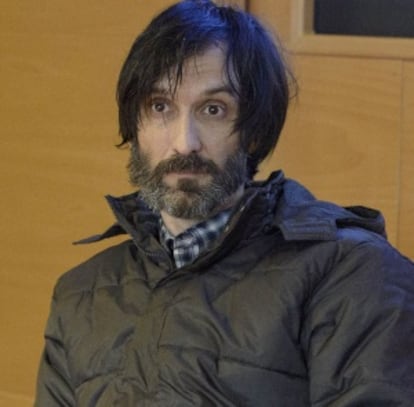Journalists come home after six-month kidnapping ordeal in Syria
Reporter Javier Espinosa and freelance photographer Ricardo García Vilanova reunited with families The men are yet to give any details about their experiences
“We are fine. Both of us – Ricardo and myself.”
It was 9.20pm on Saturday when Javier Espinosa, a reporter for the Spanish daily El Mundo, called the newsroom in Madrid and informed his colleagues that he and the freelance photographer Ricardo García Vilanova were free men again after six months of captivity in Syria.
He spoke calmly, as though filing a story rather than putting an end to a 194-day ordeal, noted the secretary who picked up the phone.

Hours later, the Spanish journalists arrived at the Torrejón de Ardoz air base near Madrid aboard a military aircraft. Waiting for them on the runway were their families, Deputy Prime Minister Soraya Sáenz de Santamaría, and Félix Sanz Roldán, the head of Spain’s CNI intelligence services.
“Looking visibly thinner but in good health, both men were reunited with their loved ones,” reported El Mundo, underscoring “the permanent smile” on the face of Mónica García Prieto, Espinosa’s partner, who is also a journalist. The couple have two children.
The reporter and the photographer’s parents were also there to welcome them home.
In that first call to the newsroom, Espinosa confirmed that he and García Vilanova were in Turkish territory after being delivered into the hands of the military along the Syrian border. Soon after that, Spanish authorities launched the operation to bring them home.
While Espinosa said they could not reveal any details about their kidnapping, his partner García Prieto sent a message via her Twitter account describing their feelings in the last few hours: “Pure joy,” read the message.
Espinosa’s partner used Twitter to describe their feelings in the last few hours as “pure joy”
Espinosa and García Vilanova were captured on September 16, 2013 as they were attempting to leave the country after covering the civil conflict there for two weeks. They were at a checkpoint known as Tal Abyad, in the northern province of Raqqa, when members of the insurgent Islamist group ISIL (Islamic State of Iraq and the Levant) took them prisoner in an area that is now under their full control.
Another Spanish journalist, Marc Marginedas of El Periódico de Catalunya, was also kidnapped in Syria on October 4. He was released on March 2, also in Turkey.
Both Espinosa and Vilanova are seasoned journalists who have been covering conflict zones for decades. During his 20 years as a foreign correspondent, Espinosa, 50, has won several industry awards, including the King of Spain prize and the Ortega y Gasset.
The photographer García Vilanova, 41, has been covering international news for 15 years for Reuters, Agence France Presse and Al Jazeera in places such as Haiti, Afghanistan and Libya.
There are 30 journalists still being held against their will in Syria, according to the NGO Reporters Without Borders. There were 48 kidnappings in 2013, and 25 reporters have been killed since the first uprising against the regime of Bachar el Assad began in March 2011, according to the association’s estimates.
Tu suscripción se está usando en otro dispositivo
¿Quieres añadir otro usuario a tu suscripción?
Si continúas leyendo en este dispositivo, no se podrá leer en el otro.
FlechaTu suscripción se está usando en otro dispositivo y solo puedes acceder a EL PAÍS desde un dispositivo a la vez.
Si quieres compartir tu cuenta, cambia tu suscripción a la modalidad Premium, así podrás añadir otro usuario. Cada uno accederá con su propia cuenta de email, lo que os permitirá personalizar vuestra experiencia en EL PAÍS.
¿Tienes una suscripción de empresa? Accede aquí para contratar más cuentas.
En el caso de no saber quién está usando tu cuenta, te recomendamos cambiar tu contraseña aquí.
Si decides continuar compartiendo tu cuenta, este mensaje se mostrará en tu dispositivo y en el de la otra persona que está usando tu cuenta de forma indefinida, afectando a tu experiencia de lectura. Puedes consultar aquí los términos y condiciones de la suscripción digital.
Últimas noticias
Most viewed
- Reinhard Genzel, Nobel laureate in physics: ‘One-minute videos will never give you the truth’
- Oona Chaplin: ‘I told James Cameron that I was living in a treehouse and starting a permaculture project with a friend’
- Pablo Escobar’s hippos: A serious environmental problem, 40 years on
- Chevy Chase, the beloved comedian who was a monster off camera: ‘Not everyone hated him, just the people who’ve worked with him’
- Why we lost the habit of sleeping in two segments and how that changed our sense of time









































